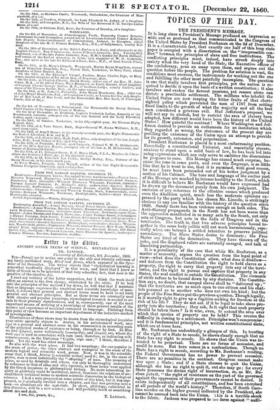Itthr hi tbr &tin.
ANCIENT GREEK TERMS OF SCIENCE. RECLAMATION BY DR. LAYCOCK.
University of _Edinburgh, 8th December, 1860. Sin—Permit me to notice one point in the able and friendly criticism of my lately-published work, Mind and Brain, which appeared in the Spec- tator of 1st December. The writer objects that "etymological learning is somewhat needlessly displayed" in that work, and hints that I know so little of Greek as to be ignorant of that very schoolboy fact, that Aids is the genitive of the obsolete AN.
I need say nothing of the latter suggestion, but I think the work itself offers an answer to the first charge, overlooked by the critic. If he look into the principles of the method I lay down, he will find that I maintain that as language expresses the empirical and scientific knowledge of man- kind, it follows that general and abstract terms must be held to set forth general and abstract principles. But as these terms are constantly used with abusive and popular meanings, etymological research is needed to at- tain to their primary signification, and is, consequently, one of the most important means of arriving at a knowledge of these general results of the science and experience of mankind contained in language. Philology from this point of view becomes an important department of the inductive method of investigation.
Illustrations of these views may be drawn from the etymological inquiries your critic specially objects to. Aratus, in his astronomical work, uses et.ti in a general and abstract sense in his enumeration in ascending scale of the principal modes of existence or being, through or by God. In Him we live (Kclipas). move volitionally (tavoitea), and (ialau) are, where the verb slid is used as correlative with sum (and, therefore, as indicating self- consciousness), in the Cartesian " Cogito, ergo sum ; " I think, therefore I exist. Yet the word has other meanings. So also with the word Tivor. It had two meanings; the one popular in the sense of proles ; the other abstract and zoological in the sense of the modern logical and scientific word, genus. Now, it was in the scientific sense that, I think, Aratus (a scientific writer) used it ; for, in the sense of proles, man is most indubitably, the " offspring" of man. The meaning of ylvos, as used by Aristotle and others, can only be thoroughly understood by reference to that of tidos and Lbia (species), as those terms were applied by the Greek inquirers to philosophical biology. No more interesting in- quiry in philology could be instituted, indeed, than into the relations of an- cient Greek technical terms to modern scientific discoveries in the biological sciences. I had a note prepared on some points of this kind, but it was sup- pressed, as it gradually swelled into a chapter, and that was growing into a book—so abundant are the materials. In short, philology, cultivated in this direction, will be a new science; and will probably teach us something about his and auk.


























 Previous page
Previous page